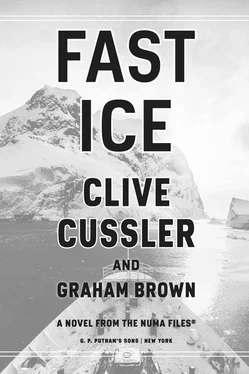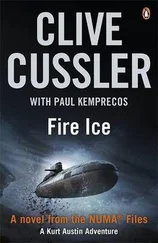The open door acted as a platform. It lined up with the top deck of the supply boat.
Ryland climbed a ladder to the roof of the pilothouse and stepped nimbly from the smaller vessel onto the bigger ship.
A crewman from the Colossus stood guard silently. Ryland passed the sailor without acknowledgment and walked inside. He descended a flight of stairs and then walked out onto a platform overlooking the empty central section of the Colossus.
This vast area below him was now filled with water. Technically, the purpose of this compartment was to add ballast and stability to the Colossus during lifting operations. Ryland’s engineers had modified it to open from the bottom, allowing submersibles to enter and leave unseen.
At the moment, a gray, tadpole-shaped vessel sat moored inside. Several of Ryland’s men were working on the bow of the craft, which had been damaged during the ramming operation. There was no flash of welding torches or the banging of hammers, only two machines being moved into place and a soft grinding noise.
Confident that the submarine would soon be repaired, Ryland continued down a catwalk that ran the length of the bay. At the far end, half hidden in the shadows, he found a tall, lean woman with straw blond hair.
Ryland studied her before speaking. Aside from a bruise on her cheek, she was a vision of near perfection.
“Are you hurt?” he asked.
Yvonne stepped forward. “I was injured when we rammed the Grishka ,” she said. “The Blunt Nose has a very stiff structure. It failed to absorb the impact the way I expected it to. The fault is my own.”
He caressed her face, careful to avoid touching the discolored skin. “Taking responsibility for our own errors is an honorable trait,” he said.
“It separates us from the blind,” she replied.
He withdrew his hand and the two of them entered the nearest corridor together, speaking as they walked. “I’m glad to see you,” he said. “We have much to discuss. Do you have the samples?”
“They survived the journey without issue,” she said.
That was good news. “Have the genetic modifications been successful?”
“It appears so,” she replied. “Reproduction rates have been increased five hundred percent, cycles shortened to forty-eight hours. You’ll have to culture them and build a large enough seed stock before you begin full-scale production. But you should have no problem.”
He nodded. That plan was already in the works. “All of that will pale in comparison to what can be released naturally from beneath the glacier. How close are we to delivering the payload from the subglacial lakes?”
“The final sluice is being carved now. We’ll have direct access to the ocean within days.”
“And the latest modeling?”
“Everything you could have asked for,” she said. “Once the microbes reach the sea, they will spread around Antarctica. Changes in the Southern Hemisphere will become noticeable within three months.”
“And then?” he asked.
“Climate change will cause increased growth of the microbes,” she said, “which will cause more climate change. Significant dislocation of human activity will occur within eighteen months. And within three years a third of the world will face mass starvation due to crop failures and a reduction in fishing tonnage. The changes peak and stabilize at the ten-year time frame, at which point eighty-two percent of the world’s landmass will be unsuitable for human activity. A massive reduction in human population will inevitably follow.”
He nodded, imagining the peace and quiet of a world no longer teeming with people. “There will be wars, of course.”
“Starving people rattle their cages,” she replied, “but they lack the will to fight. At any rate, we’ll be safe in our sanctuaries.”
Perhaps, he thought. In the long run, it mattered little to him.
“You’ve done what you needed to do,” he said. “You should be proud.”
She shook her head. “I failed to reach the Grishka before it was boarded. Two operatives from NUMA were on board when we attacked.”
“I assume they drowned,” he said.
“Unfortunately, no,” she said. “They escaped on the Grishka ’s helicopter. But they can’t have learned much. We scrubbed that ship bare.”
“They must have learned something,” he said. “They’ve asked for an audience during my party.”
She went still, then asked, “What will you do?”
“Visit with them and find out what they know,” he said.
“Do not trifle with these men,” she advised. “Cora spoke of them often. They can be very persistent.”
“Relax,” he said. “Once I have learned all I need to know, I’ll dispose of them. One way or another.”
13
NUMA OPERATIONS BUILDING
WASHINGTON, D.C.
Gamay Trout was in the NUMA science lab, goggles over her eyes, dark red hair tied back in a ponytail. Her gloved hands were submerged deep in a container of mud.
Pushing her fingers together and through the sediment, she scooped out a handful of slimy black sludge. She placed the sample on a glass tray, peeled off the gloves and switched on a bright halogen lamp.
Under the glare of the light, she picked through the muck with a stainless steel pointer, finding tiny shells and other clues that revealed what was living there.
“Did you lose your wedding ring again?” a voice asked from behind her. “You know, there are easier ways to get out of being married to Paul.”
Gamay stood back from the mess and shot Rudi Gunn a look that suggested she was not amused. In fact, she was fighting back laughter. She waved the steel pointer in his general direction. “You’d be wise not to antagonize a woman with a sharp object in her hand.”
“I happily retract my statement,” Rudi said.
Gamay allowed a smile to emerge. It was an easy smile, one that told the world she was comfortable with both being the target of a few jokes and giving as good as she got. “Retraction accepted,” she said. “For now.”
Safe from being impaled, Rudi stepped closer. “What are you doing?”
“This mud came from the bottom of San Francisco Bay,” she explained. “We’re comparing it with mud from 1939. Eighty years of shipping, oil spills and chemical runoff have taken their toll, but it’s neither dormant nor dead. Life has adapted. We find different bacteria, different mollusks, different fish poop. A whole plethora of altered organisms are living down there now.”
“Altered?”
“Adapted,” she explained. “As in became far better at living in those conditions than the ones that preceded them.”
“Fascinating,” Rudi said, though his tone suggested he was less than enthralled. “Would you like to do something more interesting?”
“Are you suggesting my work is boring?”
“No,” Rudi said. “Just that I need to pull you off this project and put you on something more urgent.”
She put the pointer down and pulled off the safety goggles. “This doesn’t have anything to do with Kurt and Joe’s sudden disappearance, does it? They were supposed to meet Paul and me for dinner last night. Never even called to cancel.”
“They were busy escaping from a sinking ship on the other side of the world,” Rudi said.
“Of course they were,” she replied. “It could never be just a flat tire with those two.”
Rudi explained why Kurt and Joe had left so hastily, quickly filling Gamay in on what had happened with Cora and the need to know more about what she might have found in the ice cores from Antarctica.
“Sorry to hear about Cora,” Gamay said. “I didn’t know her very well but I thought her research was top-notch. Does this mean you’re sending Paul and me to Antarctica to drill for additional samples?”
Читать дальше












